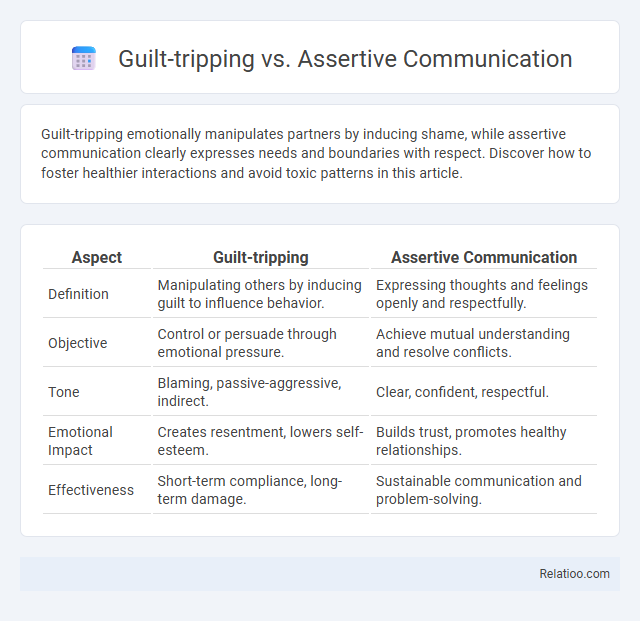Guilt-tripping emotionally manipulates partners by inducing shame, while assertive communication clearly expresses needs and boundaries with respect. Discover how to foster healthier interactions and avoid toxic patterns in this article.
Table of Comparison
| Aspect | Guilt-tripping | Assertive Communication |
|---|---|---|
| Definition | Manipulating others by inducing guilt to influence behavior. | Expressing thoughts and feelings openly and respectfully. |
| Objective | Control or persuade through emotional pressure. | Achieve mutual understanding and resolve conflicts. |
| Tone | Blaming, passive-aggressive, indirect. | Clear, confident, respectful. |
| Emotional Impact | Creates resentment, lowers self-esteem. | Builds trust, promotes healthy relationships. |
| Effectiveness | Short-term compliance, long-term damage. | Sustainable communication and problem-solving. |
Understanding Guilt-Tripping: Definition and Examples
Guilt-tripping involves manipulating someone's emotions to induce guilt and control their behavior, often leading to resentment and strained relationships. Examples include phrases like "After all I've done for you, this is how you repay me?" which create undue pressure and emotional distress. Understanding guilt-tripping is essential to differentiate it from assertive communication, which respectfully expresses needs without blaming or emotional manipulation.
What Is Assertive Communication?
Assertive communication is a clear, honest way of expressing your thoughts, feelings, and needs without blaming or manipulating others. Unlike guilt-tripping, which induces feelings of shame to influence behavior, assertive communication respects both your rights and those of others. Mastering assertive communication improves your relationships by fostering mutual understanding and reducing conflicts.
Psychological Effects of Guilt-Tripping
Guilt-tripping often leads to increased anxiety, lowered self-esteem, and feelings of manipulation, impairing mental well-being. In contrast, assertive communication promotes healthy emotional expression, fostering self-respect and mutual understanding. Psychological studies reveal that repeated guilt-tripping can erode trust and contribute to chronic stress, highlighting the importance of assertiveness training in interpersonal relationships.
Benefits of Assertive Communication
Assertive communication fosters clear, respectful exchanges that enhance mutual understanding and trust, benefiting both personal and professional relationships. Unlike guilt-tripping, which manipulates emotions and strains connections, assertive communication allows you to express your needs and boundaries confidently without aggression or passivity. This approach promotes healthier interactions and emotional well-being, empowering your ability to resolve conflicts constructively.
Identifying Guilt-Tripping in Everyday Conversations
Guilt-tripping in everyday conversations often manifests through manipulative language that induces feelings of shame or responsibility to control behavior, contrasting sharply with assertive communication, which involves expressing needs and boundaries clearly and respectfully. Key indicators of guilt-tripping include phrases like "If you really cared, you would..." or implied obligations that bypass honest dialogue, while assertive communication emphasizes mutual respect and personal accountability without emotional coercion. Recognizing these patterns helps maintain healthier interactions by distinguishing between emotional manipulation and genuine, direct expression.
Key Differences Between Guilt-Tripping and Assertiveness
Guilt-tripping manipulates emotions by inducing guilt to control behavior, whereas assertive communication expresses needs and boundaries respectfully and confidently without coercion. Guilt-tripping often leads to resentment and damaged relationships, while assertiveness fosters mutual understanding and healthy dialogue. The key difference lies in intent: guilt-tripping exploits emotions for control, whereas assertiveness promotes honest and direct interaction.
Common Situations Where Guilt-Tripping Occurs
Guilt-tripping commonly occurs in family disputes when one party tries to manipulate another by invoking past sacrifices or unmet expectations, creating emotional pressure. In workplace settings, guilt-tripping may arise when colleagues or managers leverage feelings of obligation to influence compliance or extra work without formal agreement. Romantic relationships often experience guilt-tripping during conflicts where one partner attempts to control or elicit sympathy by highlighting perceived neglect or emotional shortcomings.
Strategies to Transform Guilt-Trips into Assertive Dialogue
Transforming guilt-trips into assertive dialogue involves recognizing manipulative language patterns and shifting the focus to clear, honest expression of feelings and needs. Strategies include setting boundaries by calmly stating personal limits, using "I" statements to convey emotions without blame, and encouraging mutual respect in conversations. Practicing active listening to validate the other person's perspective while maintaining one's own stance fosters healthier, guilt-free communication.
The Role of Emotional Intelligence in Healthy Communication
Emotional intelligence plays a crucial role in distinguishing guilt-tripping from assertive communication by enabling you to recognize and manage emotions effectively, fostering respect and understanding in interactions. Unlike guilt-tripping, which manipulates feelings to influence others, assertive communication expresses needs and boundaries clearly without causing emotional harm. Developing emotional intelligence enhances your ability to engage in honest, empathetic dialogue that supports healthy and productive relationships.
Building Lasting Relationships Through Assertiveness
Assertive communication fosters trust and clarity by expressing Your needs and feelings respectfully without resorting to guilt-tripping, which often damages relationships through manipulation and emotional burden. Building lasting relationships depends on open, honest dialogue that balances self-respect with empathy for others' perspectives. Mastering assertiveness creates a foundation for mutual understanding and strong emotional connections, enabling effective conflict resolution and personal growth.

Infographic: Guilt-tripping vs Assertive Communication
 relatioo.com
relatioo.com